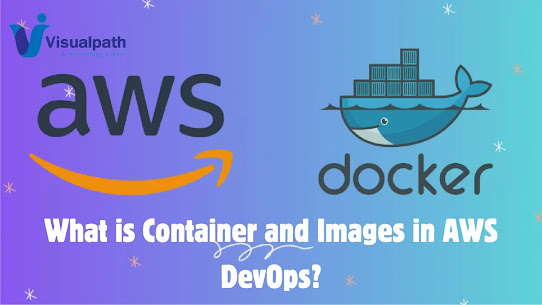What is Container and Images in AWS DevOps?
In AWS DevOps Containers and containerization have revolutionized the way applications are developed, deployed, and managed in the realm of AWS DevOps. In this article, we'll explore the concepts of containers and container images, shedding light on their significance within the AWS DevOps ecosystem.
Understanding
Containers:
Containers
are lightweight, standalone, and executable packages that encapsulate
everything needed to run an application, including the code, runtime, libraries,
and system tools. They provide consistency across different environments,
ensuring that an application runs reliably in various development, testing, and
production settings. -DevOps
Training in Hyderabad
Key Components of
Containers:
Docker Engine:
Docker
is a popular containerization platform that simplifies the creation and
management of containers. The Docker Engine is the core runtime that
orchestrates container operations. - DevOps Training in Ameerpet
Container Images:
A container image is a lightweight,
standalone, and executable software package containing the application code,
runtime, system tools, libraries, and settings. It serves as the blueprint for
creating containers. -DevOps
Online Training
The Role of Container
Images:
Container
images play a pivotal role in AWS DevOps by
enabling the consistent deployment of applications across different
environments. These images encapsulate the application and its dependencies,
ensuring that it runs reliably and consistently, irrespective of the underlying
infrastructure.
AWS DevOps and
Containerization:
In
AWS DevOps, services like Amazon Elastic Container Service (ECS) and Amazon
Elastic Kubernetes Service (EKS) provide robust solutions for container
orchestration. ECS simplifies the deployment and management of containers,
while EKS offers a managed Kubernetes service for containerized applications.
Benefits of Containers
in AWS DevOps:
Portability: Containers ensure that applications run
consistently across various environments, promoting portability and reducing
compatibility issues.
Scalability: AWS DevOps
leverages container orchestration services to dynamically scale applications
based on demand. This elasticity facilitates efficient resource utilization. -DevOps
Training
Resource Efficiency: Containers share the host OS kernel, making
them lightweight and resource-efficient. This enables higher density and
optimized resource utilization on AWS infrastructure.
Rapid Deployment: Containers can be quickly provisioned,
started, and stopped, allowing for rapid deployment and streamlined continuous
integration/continuous deployment (CI/CD) pipelines.
Isolation: Containers provide process and filesystem
isolation, enhancing security and preventing conflicts between applications
running on the same host. -DevOps
Course in Hyderabad
Conclusion:
Containers
and container images are integral components of AWS DevOps, offering a
streamlined approach to application deployment, scalability, and resource
efficiency. As organizations embrace the cloud-native paradigm, the adoption of
containerization in AWS DevOps becomes a cornerstone for achieving agility,
reliability, and consistency in software delivery.
Visualpath is the Leading and Best Software
Online Training Institute in Hyderabad. Avail complete DevOps
Training Worldwide. You will get the best
course at an affordable cost.
Attend Free Demo
Call on
- +91-9989971070.
WhatsApp: https://www.whatsapp.com/catalog/919989971070
Visit
https://www.visualpath.in/devops-online-training.html




Comments
Post a Comment